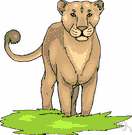puma
(redirected from Pumas)Also found in: Thesaurus, Medical, Acronyms, Encyclopedia.
pu·ma
(po͞o′mə, pyo͞o′-)n.
See cougar.
[Spanish, from Quechua.]
American Heritage® Dictionary of the English Language, Fifth Edition. Copyright © 2016 by Houghton Mifflin Harcourt Publishing Company. Published by Houghton Mifflin Harcourt Publishing Company. All rights reserved.
puma
(ˈpjuːmə)n
(Animals) a large American feline mammal, Felis concolor, that resembles a lion, having a plain greyish-brown coat and long tail. Also called: cougar or mountain lion
[C18: via Spanish from Quechuan]
Collins English Dictionary – Complete and Unabridged, 12th Edition 2014 © HarperCollins Publishers 1991, 1994, 1998, 2000, 2003, 2006, 2007, 2009, 2011, 2014
pu•ma
(ˈpyu mə, ˈpu-)n., pl. -mas.
1. cougar.
2. the fur of a cougar.
[1770–80; < Sp < Quechua]
Random House Kernerman Webster's College Dictionary, © 2010 K Dictionaries Ltd. Copyright 2005, 1997, 1991 by Random House, Inc. All rights reserved.
ThesaurusAntonymsRelated WordsSynonymsLegend:
Switch to new thesaurus
| Noun | 1. |  puma - large American feline resembling a lion puma - large American feline resembling a lionFelis, genus Felis - type genus of the Felidae: true cats and most wildcats wildcat - any small or medium-sized cat resembling the domestic cat and living in the wild |
Based on WordNet 3.0, Farlex clipart collection. © 2003-2012 Princeton University, Farlex Inc.
Translations
بوما: الأسَد الأمريكي
puma
puma
puuma
puumavuorileijona
puma
púma, fjallaljón
puma
puma
Collins Spanish Dictionary - Complete and Unabridged 8th Edition 2005 © William Collins Sons & Co. Ltd. 1971, 1988 © HarperCollins Publishers 1992, 1993, 1996, 1997, 2000, 2003, 2005
Collins English/French Electronic Resource. © HarperCollins Publishers 2005
puma
n → Puma m
Collins German Dictionary – Complete and Unabridged 7th Edition 2005. © William Collins Sons & Co. Ltd. 1980 © HarperCollins Publishers 1991, 1997, 1999, 2004, 2005, 2007
Collins Italian Dictionary 1st Edition © HarperCollins Publishers 1995
puma
(ˈpjuːmə) noun (also cougar (ˈkuːgə) ) a type of wild animal like a large cat, found in America.
Kernerman English Multilingual Dictionary © 2006-2013 K Dictionaries Ltd.